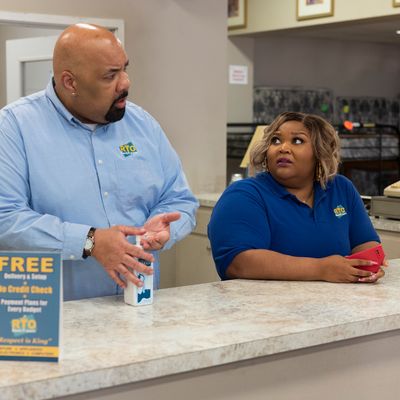
DC Comics has milked material out of one of its greatest villains in the Batman universe, the Joker. In the last 15 years, the role has been cast four different times (five if you count the utterly hysterical Harley Quinn) and given fanboys everywhere a reason to travel to the Bronx outside of their semiannual corporate trip to Yankee Stadium. After all of the rebrands — and a pending musical featuring Lady Gaga as Harley Quinn — who would have thought that the best reinterpretation of the comically sinister antagonist would be a loose imitation done by none other than Chance the Rapper?
South Side has always played around with the comical realities of class antagonism. Still, “The Laughter” is a true pièce de résistance: an interplay of pop-culture references interweaved with Chicago authenticity. Frustrated by the exploitative practices of lease-to-own furniture stores like RTO, the South side of Chicago happily welcomes the emergence of a Robinhood-style vigilante, the Laughter, that returns the furnishings back to the people. Stirred to action, Officer Goodnight dons his bumbling detective alter ego to try to solve the case, while The Laughter then antagonizes Aldermans and RTO employees. In a very funny scene, Stacy’s kitchen salon is taken apart while they are distracted by a dancing telegram doing the Roger Rabbit and the Katherine Dunham technique — she returns to no stove, a greeting card, and a note next to her hot comb saying “this burned my hands.”
It turns out that the myth of the Laughter did not start in heroism — it was purely Simon in a ski mask taking advantage of inventory oversights for a profit, who has since abandoned his post and allowed the legend to fester (or rather urban legend, but “you know how they do us). Officer Turner attempts what seems to be a sting operation to catch The Laughter, but flips it into successfully furnishing her rental units. She eventually apprehends the culprit — played hilariously by Felonious Munk — but only after one of her conspirators snitches on the whole plan. Unfortunately, he turns out to only be one in a network of vigilantes who proudly don striped paint across their faces, as Alderman Gayle discovers while he’s boasting about the capture on live radio with local Chicago host Leon Rogers.
Simon eventually returns to the original Laughter hideout, intending to bury all evidence connecting him to the heists, only to find out his longstanding antagonist, Herbert from the Currency Exchange (played by Chance the Rapper), is the mastermind behind the operation, replete with the typified monologuing of his origin story. Turner eventually joins after getting her arrest to flip by threatening to delete his entire game history. But in the meantime, Simon breaks Herbert and his gang down by claiming that this was never a revolutionary enterprise but a profit-making one while they all remain at home with their parents. They attempt to make a final fire sale of the furniture, but Herbert — smarting over being called a mama’s boy — releases gas and attempts to trap everyone in a warehouse while he drives away in a truck. After he’s apprehended, Turner conveniently decides to misreport the stockpiles of evidence in the back of the truck for her future rentals — and so the cycle continues.
In “South Suburbs,” Turner spends her birthday in the South Suburbs with her family in the house of her mother’s young boyfriend’s parents. While her sister may have forgotten the cake and her brother unable to talk about anything other than the horrifying terrors of his job at the slaughterhouse, her biggest goal is for her parents to get along for a birthday meal. Her dad — who has a young girlfriend as well, much to his children’s chagrin — does his best to remain on his best behavior per his daughter’s request, but it is quickly revealed that her parents are still occasionally bumping uglies.
Eventually, Turner’s boyfriend, Sheldon, finds out, courtesy of a household nanny cam recording the conversation, and attempts to challenge Turner’s dad to a fight. This leads to Officer Goodnight finding out that his wife has received romantic overtures, having memorized a romantic poem in Spanish she received at a music teachers’ conference. Goodnight, reeling at this revelation, accuses his wife of emotional infidelity. “You basically let the man e.e. cummings all over your brain,” he effuses, accusing her of 12 to 18 percent cheating.
Meanwhile, Simon and Kareme go on a bizarre adventure, taking the pleasantry “hit me up if you’re ever in town” literally and arriving uninvited at the house of a “financial titan.” The house and family are straight out of Get Out: frozen, stilted, peculiar, and with mannerisms utterly inaccessible to people of working-class experience, replete with their own token Black friend (which the host assumes they both know). The family recounts anecdotes about a birthday gone wrong: “She wanted her favorite artist, Billie Eilish. He never showed up. Meanwhile, some emotional girl shows up with green hair.”
The duo gets swept up in a bevy of incomprehensible drinking games, where they are consuming “absinthe, sweet cream, and a splash of Capri Sun.” Eventually, they figure out that the Connor problem they are hunting at gunpoint is their 13-year-old son, who called their mom a “bitch” for opening his yogurt for him. When they find him, he is more indignant than ever, calling his mom “Maggie, the cuntiest cunt who ever cunted her way to cunt town, population cunt, just over the cunt river and through the cunt woods.” The spell is quickly broken: These are white people’s problems that Simon and Kareme are not familiar with, nor are they trying to become familiar with. Maybe they don’t have class trappings, but they do have healthier family dynamics than what they saw from their tour out to the South Suburbs.

